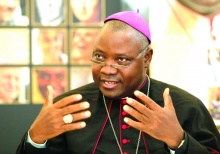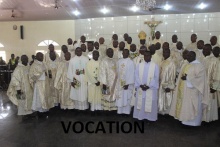Archbishop Kaigama (Middle) with members of the Catholic Media Practitioners Association of Nigeria (CAMPAN) and members of the Archdiocesan Communications Commission
The Archbishop also noted that there is the strong perception that Nigeria’s economy is heading for the doldrums and unless the menace of corruption is scotched. “It will only be a matter of ‘when’ and not ‘if’ before this is actualized – God forbid! Everywhere, people have the penchant for cutting corners, in order to beat laid down rules and procedures. Each Government declares a vicious war against corruption, only for it to end up being swallowed up by the same monster”.
According to the prelate, “We are yet to witness a concerted effort by the government to ensure that public officials accused of greed and grafts are brought to book without delay or debate. What is more, the necessary loopholes through which monies are siphoned from the public treasury are yet to be plugged, giving credence to the assertion that there is no credible template created upon which the war on corruption is to be fought”, the Archbishop stated.
Below is the full text of Archbishop Kaigama’s Briefing:
AN INTERACTIVE SESSION WITH CATHOLIC MEDIA PRACTITIONERS, CATHOLIC ARCHDIOCESE OF ABUJA, 7TH MAY, 2021, IN PREPARATION FOR WORLD COMMUNICATIONS DAY. ADDRESS BY ARCHBISHOP IGNATIUS A. KAIGAMA, ARCHBISHOP OF ABUJA COMMUNICATION AS A CHANNEL FOR BUILDING BRIDGES
INTRODUCTION
The World Communications Day was established by Pope Paul VI in 1967 as an annual celebration that encourages us to reflect on the opportunities and challenges that the modern means of social communication (the press, motions pictures, radio, television and the internet) afford the Church to communicate the Gospel message. Pope John Paul II (1990) in his encyclical Redemptoris Missio 37 said: “The world of communications is unifying humanity and turning it into what is known as a ‘global village’”. Aware of the world as a global village and the power of the media, the Church has sought to be in there with its message and to use the media to proclaim the values it sees are beneficial for human development and for the eternal welfare of people.
ENCOURAGEMENT
We thank all of you media professionals – journalists, camera operators, editors, directors – who often sacrifice time, energy and resources to carry out your work with courageous commitment to provide information about those suffering in the shadows, natural and man-made disasters, cases of oppression and injustice inflicted on the poor, issues of the environment, inter-ethnic and inter-religious conflicts, democracy and its impact on our society, etc. We cannot allow your voices to fade away or be silenced, which explains why the international community marked the World Press Freedom Day on May 3. Our entire human family would be impoverished and would be the worst for it if the opinions and information of media practitioners are ignored or misinterpreted.
The theme of Pope Francis, for the 2021 World Communications Day (16th May) is, “’Come and See’ (Jn. 1:46): Communicating by encountering people where and as they are”. The Holy Father says, “it is necessary to move beyond the complacent attitude that we ‘already know’ certain things. Instead we need to go and see them for ourselves, to spend time with people, to listen to their stories and to confront reality…”
I believe this is a call against yellow journalism and arm-chair journalism.
SOME NATIONAL ISSUES
The 2021 World Day of Communication is an auspicious occasion to highlight some of the major challenges that have continued to serve as cogs in the wheel of development and progress of our dear nation with a view to seeing how best we can resolve them.
COVID-19 PANDEMIC: In the face of the Covid-19 pandemic, the human family is asked to feel itself and live really as an inter-connected and inter-dependent family, to provide assistance to the less privileged and marginalised, irrespective of faith, social standing or ethnic background. These resources whether in forms of food palliatives, medical supplies or knowledge, must be judiciously and honestly used to benefit the poor. The use of vaccines or immunization, as a way of responding to the pandemic is a global public good, provided that the vaccines are safe, efficacious and adequate.
All of us must keep the entire world in fervent prayer, as requested by Pope Francis that we dedicate the month of May to ask the intercession of our Blessed Mother for the end of Corona Virus pandemic.
SECURITY: At the moment, insecurity is the greatest challenge facing our country. Boko Haram has menacingly ravaged the land, the herdsmen/farmer menace has festered and spread and has today developed into banditry, kidnapping, armed robbery, and brutal killings. As many Nigerians cry out, the Presidency and the Congress in the United States have signaled to us to put our house in order. The House of Lords in the United Kingdom had debated the Nigerian security situation. Nigeria is said to be the third country most impacted by terrorism. We call on the Government to do the needful in ensuring that terrorists are checkmated, criminals rounded up, bandits dismantled, and kidnappers put out of business. The proliferation of many forms of “self-help” security organizations is evidence of security deficiency. Government should open up discussion, debate and dialogue about the issues at hand, across political party, religious or ethnic lines.
YOUTH: In hindsight, the youth played significant roles in the development of this nation. It was especially the youths who took over the government from the colonialists. Today, certain challenges have tended to inhibit the active participation of the youth in the economic and political transformation of our country, among which are nepotism, unemployment and poverty. What is more, corruption among public officials does not set a good example for our youth today. Our energetic, dynamic and innovative youths, must be able to shape the future they will inherit, and that future begins today. With a rapidly expanding youth population, the future of Nigeria belongs to the youth. Our leaders must ensure that young people are given a level playing ground in both economic and political matters.
ECONOMY AND CORRUPTION: There is the strong perception that our economy is heading for the doldrums and unless the menace of corruption is scotched, it will only be a matter of ‘when’ and not ‘if’ before this is actualized – God forbid! Everywhere, people have the penchant for cutting corners, in order to beat laid down rules and procedures. Each Government declares a vicious war against corruption, only for it to end up being swallowed up by the same monster. We are yet to witness a concerted effort by the government to ensure that public officials accused of greed and grafts are brought to book without delay or debate. What is more, the necessary loopholes through which monies are siphoned from the public treasury are yet to be plugged, giving credence to the assertion that there is no credible template created upon which the war on corruption is to be fought.
UNEMPLOYMENT: The rate of unemployment in Nigeria is not only alarming but a national embarrassment. Our youths are looking for jobs that are not just there. Are we surprised about the devastating consequences revealed in anti-social behaviors, drugs, alcohol, violence and reckless lifestyle are? More industries should be established to absorb the ever increasing yearly turn-out of graduates from our universities. Individuals also should not be dependent on the government; skills and vocational training should be learnt to establish and empower oneself.
CONCLUSION: BUILD BRIDGES THAT CREATE UNITY AND PROGRESS
In conclusion, the Holy Father challenges us to use our communication skills to build bridges that create unity. We must respond to the revolution taking place in communications media and in information technologies “with fresh energy and imagination as we seek to share with others the beauty of God.” (Message of Pope Francis for the 48th World Communications Day, 24th January, 2014)


